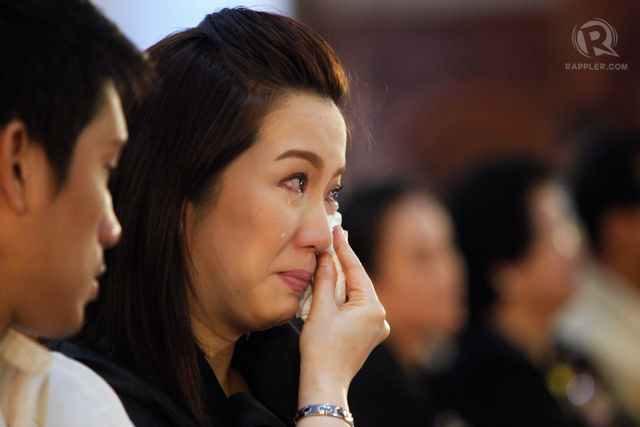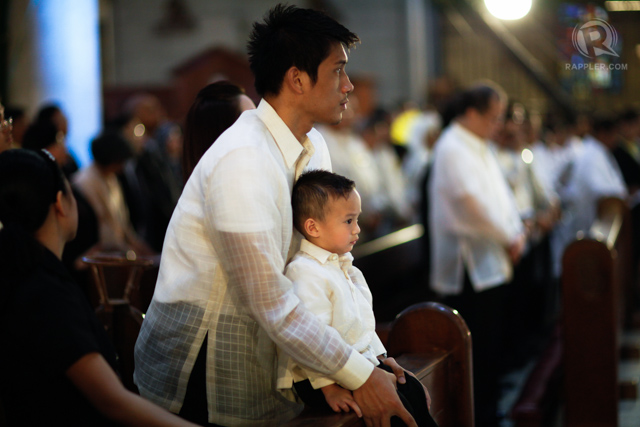SUMMARY
This is AI generated summarization, which may have errors. For context, always refer to the full article.
The camera began rolling when she was seven years old. They called her Kris, the small girl with flyaway bangs and missing teeth who stood on her tiptoes to speak into double microphones.
My name is Kris Aquino, she said. My father is in jail. Please vote for him, so I can see him again.
The Aquino women, mother and daughters, have withstood decades of media coverage with quiet resignation, standing in the floodlights without basking in the glow. The exception is their youngest, the precocious Kris, who moved on from being the national princess to a bright name in the marquee, romping with veteran actors in comedies until she was alternately raped and murdered in a handful of massacre films. Kris the star was also Kris the rebel, whose attempt to fit into the family portrait of pearl-earringed, quiet-voiced Aquino women in long yellow skirts failed with each controversial boyfriend.
Watch her, daughter of heroes, heiress to a legend, sister to the yellow king, hawking laundry detergent and condominium units in billboards along the same highway her mother walked in 1986. Watch her weep over lost love, listen to her smilingly announce her willingness to knife her brother’s detractors, see her celebrate her birthday, walk down the beach, eat kimchi, meet friends, giggle over gossip, deny allegations, demand apologies, reveal secrets, break her silence, exclusive, now, tonight. The same years that anointed her mother a national saint has made Kris Aquino into a creature of the camera, one that glories in the invasion, courting attention with the same apparent single-mindedness of a mermaid hoisted over a pool in a circus cage.
Unlike the sisters who molded themselves in the image and likeness of the sainted Corazon, Kris’ history is fraught with married lovers, broken promises and public dramas, the sort of scandalous career expected of actresses and divas, certainly not behavior to be tolerated from the prized presidential daughter. And yet she is still an Aquino, born on the side of angels, who must publicly become, if not the martyr, the victim, cast in every controversy as the innocent trapped by bad men and worse circumstances.
This is the odd phenomenon that is Kris Aquino. She is not merely a celebrity; she is a symbol. Public humiliation may be occasionally acceptable, even courted, but public disapproval is never to be permitted. Each episode ends with the weeping heroine, on occasion flanked by mother or brother or phalanx of sisters. The line is drawn carefully between the forces of good and evil. She may have done wrong, but she regrets it. She is not the enemy; she is a victim.

Courtroom built by media
The newest of her morality plays begins quietly, in newspaper stories of a case filed by one Kristina Bernadette Cojuangco Aquino, requesting a Temporary Protection Order against one James Yap. The petition accused the basketball player of entering the bedroom of his erstwhile wife in an attempt to make “overt sexual advances” that Kris “vigorously resisted,” provoking Yap to “utter mean and malicious statements” in the face of rejection as witnessed by the couple’s five-year-old son Bimby. (READ: Kris Aquino files TPO against James Yap)
Yap gave a teary-eyed interview denying the accusations. The sexual advance, he said, was a kiss, or an attempt at a kiss, a joking effort to get his own son to kiss his father. Kris, he said, was trying to turn his son against him.
And so the circus begins. One day after the James Yap interview, Kris Aquino went live on national airwaves, in special reports anchored by the most trusted of trusted network anchors, aired over the largest of broadcasting stations. Her three sisters provide a black-clad Greek chorus beside her, each with hands clasped and legs crossed at the ankles.
Kris is only being a good mother, they said. Bimby is our priority, they said. Our mother would have wanted us to be here, they said.
In the story told by Kris Aquino, she is a woman wronged, persecuted and harassed, her womanhood threatened, her dignity offended, her child mistreated by the evil whose name is James Yap. Kris appealed to the interviewer, one woman to another. Jessica, she said, Jessica, really, what he said, that was really offensive.
The message was clear. I will do anything for my child. I want him to grow up knowing his mother fought for what is right. I will give up everything, anything, for my child.
And yet this victim, this brave, sacrificing woman, still failed, as of this publication, to file in court any charge of assault, rape, attempted rape, or the entire slew of legal cases against the man who allegedly violated her as a woman. Instead she filed a single petition for a protection order that would make it impossible for James Yap to go near his son.
To Kris Aquino, the highest court in the land is not the judiciary. It is the national public, in the courtroom built by the national media.
This is, after all, the same woman who hauled her family before the camera in 2003 to accuse former lover Joey Marquez of passing on a sexually-transmitted disease, who used her own congressman-brother as her spokesperson, who claimed weeping she had been beaten and threatened with a 9mm gun, who filed the right cases and said the right words, and was celebrated for her courage to stand for the thousands of abused women in the country. This is also the woman who then dropped all criminal charges the moment Joey Marquez made a public apology and abased himself on national television.
There was, it seemed, very little need to extract truth or justice in court. In the case of Joey Marquez, the one court that mattered had already declared a winner.
Understand me, she appealed to the public as she appeals now. She invokes the untouchables of the national narrative. I am mother, daughter, woman; I am helpless and hurt. I have sinned, but they have done worse.

What she forgets
Kris herself is surprised each time her family becomes the story. How, she asks, could the public say her own brother was involved, when James Yap claimed she had threatened him with her brother’s political position? How could they say her mother raised her badly, she asks weeping after the former justice secretary (Erratum: We had mistakenly described him as “the late…” We regret the error.) Raul Gonzalez suggested Corazon Aquino had better manage her own daughter before she tried managing the country. Why, she asks, in long, tear-filled monologues, does the public punish my family with my sins?
She forgets, for example, that she has actively made herself part of her family’s political life, campaigning for her brother’s election, endorsing candidates, linking her name irrevocably with the Aquino brand. She forgets the promise she made in 2010, when she offered to leave the country if her brother was elected president to protect him from the backlash of her personal scandals, effectively admitting she has some responsibility towards his public image.
She forgets, more importantly, that every time she hauls her siblings to stand behind her on interviews to convince the public she is the victim, she makes the story not about Kris Aquino the woman, but Kris Aquino the daughter, the sister, the woman whose political power makes it possible to accept personal apologies from former Presidents. She has, for all intents and purposes, signed away the right to demand the public see her only as herself and not as an Aquino with an Aquino’s capacity to influence the national agenda.
The Aquino sisters have denied the President is involved. It is a brazen lie, they say, Kris is a victim in need of succor. Perhaps this is true, as true as it is for thousands of other women who have suffered the same as Kris claims to have suffered. Yet it is not easy to cast this woman as helpless. Neither is it easy to ignore the other image of a yellow juggernaut stomping into the scene to silence the protests of an inarticulate basketball player fumbling his way into fatherhood.
Whether or not James Yap is a talented actor, whether or not Kris was harassed, humiliated and assaulted, whether she is heroine or liar or bitch, all of these are now left to the public imagination, in a forum that Kris has willingly chosen, where she has won, again and again. And yet the punchlines are tangling, three decades of instant replay making this story just another iteration in a soap opera whose ratings are steadily plummeting. Social media is filled with these viewers, and although there is little to prove the validity or magnitude of the national exasperation—or national apathy—resulting from yet another Aquino scandal, the goodwill earned by the Aquino legend is not an unlimited currency. Her father gave up his life in the service of the nation, Kris Aquino is giving up a television show in yet another convoluted act of martyrdom.
Perhaps this is not the fault of Kris Aquino, if this is indeed a fault at all. It may be the only role she knows, and perhaps the only role she is permitted to play. But the cameras are still rolling. The microphones are set, the crowds are in their place, and the girl is onstage, waiting for her close up. – Rappler.com
Add a comment
How does this make you feel?
There are no comments yet. Add your comment to start the conversation.